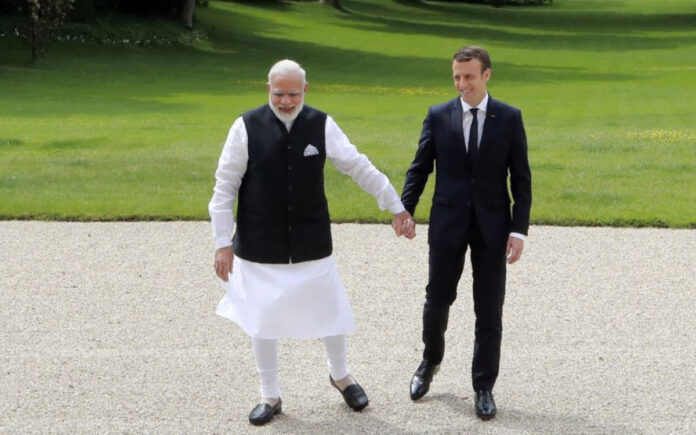Paris/New Delhi: The India-France strategic defense partnership is poised for a significant advancement as the Emmanuel Macron government prepares to discuss and support the construction of nuclear attack submarines. This collaboration includes a commitment to 100% transfer of technology for 110 kilo-Newton thrust aircraft engines and underwater drones equipped with full capabilities.
These topics are central to the upcoming India-France strategic dialogue scheduled for September 30 to October 1, where National Security Advisor Ajit Doval will meet with Macron’s diplomatic advisor, Emmanuel Bonne, in Paris. This marks the first bilateral strategic engagement following Macron’s visit to India in January.
During his visit, Doval is also expected to meet with Macron to brief the French President on India’s efforts to resolve the Ukraine conflict. Macron has shown strong support for Indian initiatives aimed at engaging with Russia to bring an end to the war and address its impacts on the Global South.
Earlier this month, Doval traveled to Russia, where he briefed President Vladimir Putin on Prime Minister Narendra Modi’s discussions with Ukrainian President Volodymyr Zelensky regarding pathways to peace, highlighting India’s proactive diplomatic stance.
The partnership between France and India extends into new domains anticipated for future conflicts, such as space. Doval previously signed a letter of intent concerning military satellites with French Defence Minister Sébastien Lecornu during Macron’s Republic Day visit as chief guest.
France’s offer on submarines arrives as the Indian Navy emphasizes the necessity for two nuclear attack submarines to enhance operational capabilities. Additionally, France has proposed full-spectrum autonomous systems for India across air, surface, and underwater domains, aimed at bolstering India’s intelligence, surveillance, and reconnaissance (ISR) capabilities while safeguarding naval assets like submarines.
Also Read | Ukraine Peace Efforts Hit Roadblock as Russia Rejects Summit Follow-Up
Doval is also expected to advance discussions regarding an offer from Kolkata-born Chairman of Safran Engines, Ross McInnes, made during his recent visit to India. Safran, which assisted ISRO in developing space rocket engines in the 1970s, has proposed a joint effort to design, develop, certify, and produce 110 kN engines for the future Advanced Medium Combat Aircraft (AMCA) project, including 100% transfer of technology for hot engine sections. This partnership would enable India to retain sovereign ownership of the engine, allowing for unrestricted export to third countries. Moreover, Safran aims to provide training in advanced metallurgy to Indian engineers, ensuring the sustainability of India’s defense capabilities.
France has long been a reliable supplier of advanced weaponry to India, with this partnership playing a crucial role in India’s strategic autonomy. Current negotiations include the potential acquisition of 26 Rafale-Maritime fighters for India’s two aircraft carriers, along with the French Naval Group’s commitment to jointly construct three additional Kalvari-class diesel attack submarines under Project 75. The Indian Air Force is also looking to France for additional Rafale fighters to address its depleting squadron strength.
Also Read | US Endorses India’s Push for Permanent Membership in UN Security Council
Deepening Cooperation in the Indo-Pacific
While defense and security will be pivotal to the September 30 dialogue, sources indicate that Doval and Bonne will address additional matters of mutual interest. France and India are committed to enhancing their cooperation in the Indo-Pacific, particularly focusing on the Indian Ocean, where both nations are resident powers. The two advisors will also deliberate on the Middle East conflict and the recent targeting of commercial shipping by Houthi forces in the Red Sea. France has expressed a keen interest in the India-Middle East Economic Corridor and has appointed a special envoy to support this ambitious initiative. The discussions will also encompass the current situation in Bangladesh and the upcoming elections in Sri Lanka as part of the broader strategic dialogue.



